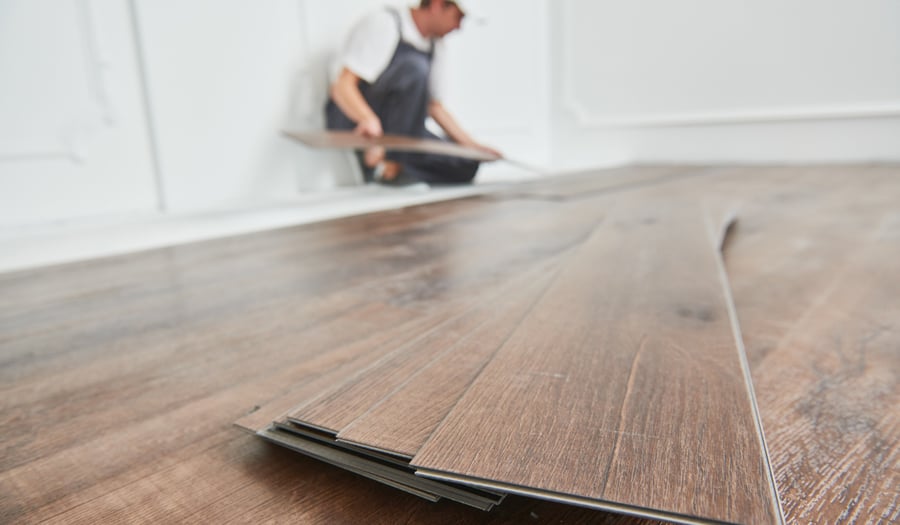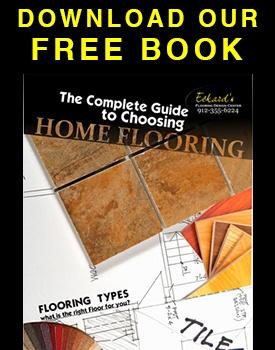The Short Answer: The differences in thickness of LVPs (Luxury Vinyl Planks) is for the most part only worth considering for personal preference. Depending on if their base is composed of wood or stone, the sound and feeling when stepped on is going to be different.
Overall Thickness & Luxury Vinyl Plank Composition
There are two major types of plank composition on the market today, WPC & SPC.
WPC stands for Wood Plastic Composite. Far from the compressed cardboard core of a laminate product, these products do have a wood component, but are still completely waterproof. They tend to be a little thicker, and because they’re a little softer than their SPC counterparts, they tend to be a little more comfortable underfoot and a little quieter. It is very important to establish, however, that sound is very, very subjective. People have different ideas of what a floor should sound like. Some like a deeper sound, mimicking a solid hardwood floor, while others prefer a shallow tap, more like a concrete surface. If sound is important to you, try to do what you can to find the sound you prefer with a floor you like and walk on it for yourself. If any salesperson tells you one floor is going to be “quieter” than another, always remember that their definition of “quiet” may be different than yours. One thing you can expect out of any waterproof floor, is that it won’t sound like a loud, clappy laminate floor.
SPC stands for Stone Plastic Composite. These products by design, are denser, and have paved the way for thinner, more economical products that still have a solid core. The denser core of the SPC products makes them a bit more dent resistant, but a little harder feeling under a foot, as they are literally made from stone fillers like limestone. These products are not louder, per-se, when you walk on them, but they do sound different; the floors won’t sound quite as soft.
Let’s recap on these two categories.
WPC:
- Wood Plastic Composite
- Some say more comfortable underfoot
- There’s some variety in sound, but often is considered the quieter option.
SPC:
- Stone Plastic Composite
- Harder on feet
- Some say louder
- More dent resistant
The mix of qualities these products boast makes it hard to strictly promote one over the other.
The idea of product thickness is a fairly easy concept to understand. Measured in millimeters (mm), these products generally start around 4, and can go past 8. This is a bit of a tricky metric to use when assuming the quality of a product. Thicker products cost more, which should come as no surprise, but what benefit comes with a thicker plank? There isn’t much difference in the warranties offered from one to another as they are no more scratch resistant nor do they offer any greater dent resistance or protection from water… Initially, it can be difficult to identify why someone might pick a product specifically because of its thickness. Thicker products however, do actually come with benefits. Things like a better, more realistic photo layer, thicker wear layers, and better attached cushioning. Thicker products tend to occupy space at the top of the manufacturer’s offering, but thickness itself is a difficult metric to accurately appraise. The thicker, beefier body of the plank also means the locking system itself is thicker, making the product a little more user friendly for the diy folks. Finally, a thicker WPC core makes for, perhaps a bit better feel underfoot. But again, these qualities are a bit harder to quantify and may or may not justify an increased price for you. We generally don’t use overall plank thickness as a strong selling feature.
Takeaways for the thickness of planks:
- Thicker planks usually come with other features to justify a greater price.
- It can be difficult to identify objective benefits from thicker or thinner planks.
- It isn’t the best identifier of overall quality.
The Bottom Line: When considering purchasing LVP for flooring, the thickness of the planks themselves shouldn’t be a deciding factor alone, as it doesn’t necessarily affect the quality or lifespan of your flooring.



